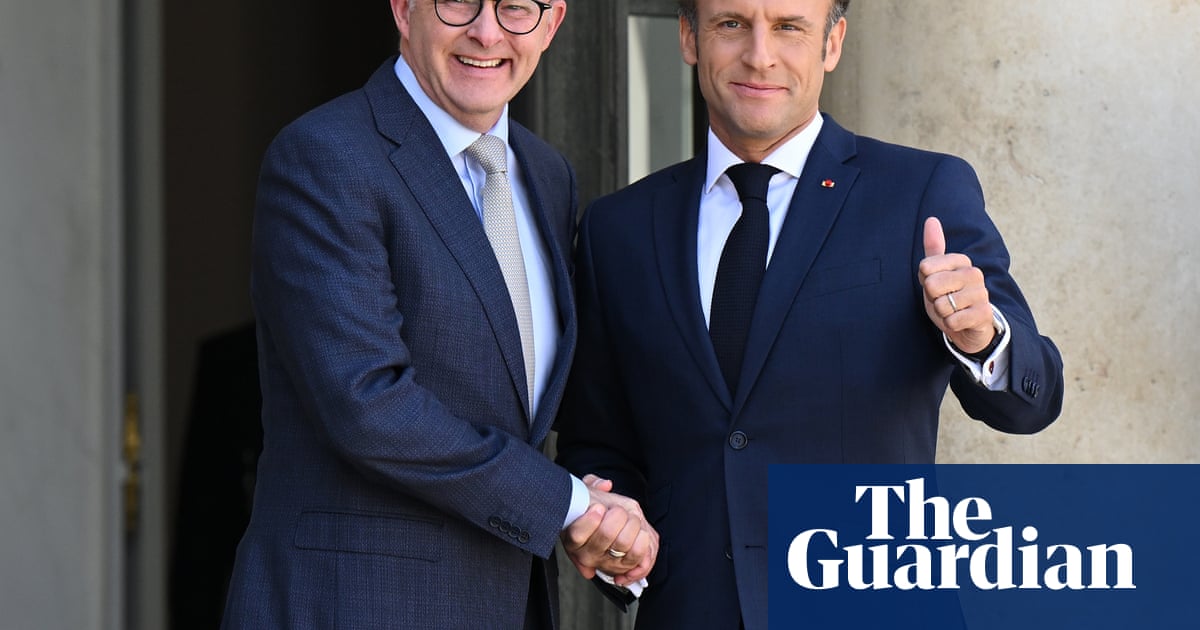Australia is under pressure to join an international push to recognise Palestinian statehood as the French president,Emmanuel Macron, rallies global support for a new Middle East peace pact.
France has been lobbying western nations – including Australia and the UK – before aUnited Nations-backed summit in New Yorkthis month designed to accelerate momentum for a two-state solution.
Speculation has been growing thatFrance, which is co-chairing the conference with Saudi Arabia, will use the conference to recognise Palestine in an attempt to kickstart the peace process.
Last week Macron said recognition of Palestine was “not only a moral obligation” but “also a political necessity” as he urged European nations to “harden our collective stance in the coming hours and days” onIsraelif the humanitarian crisis in Gaza were allowed to persist.
France, along with Australia, the UK and the US, does not recognise Palestine, in contrast to the position held by147 of the 193 UN member states.
“Beyond the humanitarian tragedy, what is at stake is the very possibility of a Palestinian state,” Macron said on Friday in Singapore. “We clearly see that some are trying to make a Palestinian state impossible. But what we are defending is a political outcome to the situation.”
In a statement to Guardian Australia, a French ministry of foreign affairs spokesperson confirmed it was working with international partners – including Australia – on its four priorities for the summit in New York from 17 to 20 June.
These are recognition of a state of Palestine, normalisation of relations with countries in the region, reform of the Palestinian Authority and disarmament ofHamas.
Sign up for Guardian Australia’s breaking news email
“President Macron would like this possible recognition to be part of a wider political dynamic that will enable progress to be made, on the one hand, in establishing a Palestinian state and, on the other, in Israel’s regional and international integration,” the spokesperson said.
“We are striving to bring as many states as possible on board with these objectives, and we know that Australia is a country with strong affinities for this issue and is strongly committed to it.”
Sign up toBreaking News Australia
Get the most important news as it breaks
after newsletter promotion
A spokesperson for foreign affairs minister,Penny Wong, said Australia was “engaging with the organising countries and partners ahead of the conference”.
“The two-state solution conference has an important role in progressing the political, economic and security issues that need to be addressed to implement a durable and lasting two-state solution,” the spokesperson said.
Echoing aspeech by Wong last year, the spokesperson said Australia “no longer sees recognition of a Palestinian state as only occurring at the end of negotiations but rather as a way of building momentum towards a two-state solution”.
Prof Don Rothwell, an international law expert at the Australian National University, said the summit was a “novel process” that “reflects the view ofFranceand a number of like-minded states that there needs to be a different approach taken to try to resolve this issue”.
Speculation of a looming shift in the federal government’s position intensified last week after Anthony Albanesedescribed Israel’s blockade of food and aid into Gaza as an “outrage”in his strongest rebuke of Benjamin Netanyahu’s government yet.
“It is outrageous that there be a blockade of food and supplies to people who are in need inGaza… People are starving,” the prime minister said. “The idea that a democratic state withholds supply is an outrage.”
It’s understood Albanese has spoken to the Israeli president, Isaac Herzog, and Wong has spoken to her counterpart, Gideon Sa’ar, in the past fortnight.
The shadow foreign affairs minister,Michaelia Cash, said the opposition supported a Palestinian state but only at the end of a peace process, which would include the release of hostages held by Hamas.
“There can be no recognition of a Palestinian state with Hamas still in control ofGaza,” she said. “To recognise Palestinian statehood now would be rewarding terrorism.
“International leaders should be applying maximum pressure on Hamas to immediately and unconditionally release all remaining hostages and surrender all terrorist capabilities.”
The Executive Council of Australian Jewry president, Daniel Aghion, said Palestinian recognition without a concurrent plan to end Hamas’s rule would be a “betrayal of all parties to the conflict”.
